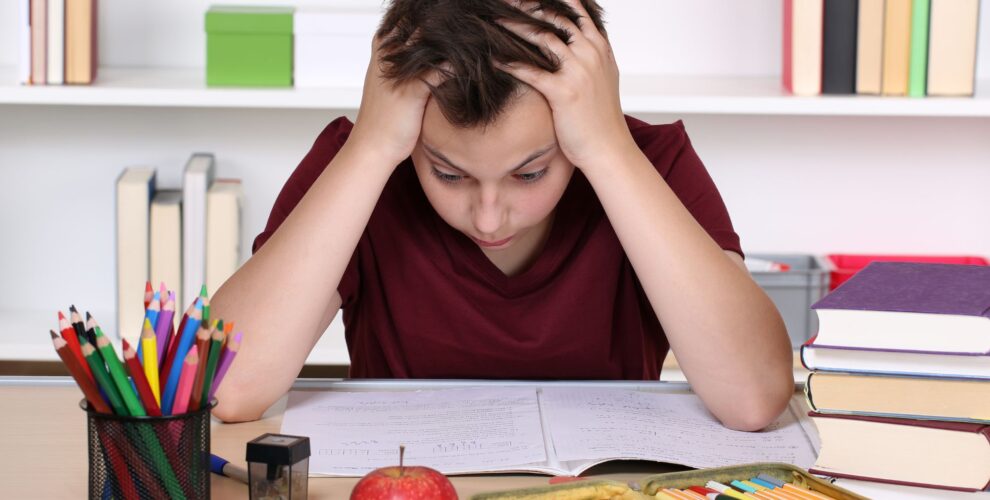Mastering the art of handling pressure is a crucial aspect of your child’s school experience, encompassing challenges such as exams, assessments, social dynamics, sports and competitions, transition periods and self-expectations. Stress, a natural response to pressure, can be classified as either positive (eustress) or negative (distress). While some stress enhances alertness and productivity, excessive stress may adversely affect the mind and body. Maintaining balance is important for your child’s mental health and wellbeing.
Here are some suggestions to help your child deal with pressure:
- Recognise symptoms of excessive stress
Stress can be experienced in several ways, through our thoughts, feelings and behaviours.
Encourage your child to identify stress symptoms, including headaches, fatigue, muscle tension, anxiety, mood swings, or low self-esteem. Discuss each symptom in detail, providing examples and emphasising the importance of self-awareness. Create an open environment where your child feels comfortable sharing his or her experiences, ensuring they understand that seeking support is a sign of strength.
To learn more about stress management, check out this video.
- Set realistic goals and expectations
Guide your child in setting realistic, achievable goals aligned with their abilities and aspirations. Emphasise the significance of progress over perfection, encouraging a growth mindset. Discuss the potential consequences of setting unrealistic expectations and the benefits of celebrating small victories along the way.
- Discuss the positives of pressure
Pressure can be a powerful catalyst for personal and academic growth. When individuals face challenging situations, stress triggers the release of hormones such as adrenaline and cortisol, creating a heightened state of alertness. This heightened state of eustress can lead to increased energy and productivity, enabling individuals to perform at their best during specific tasks or events.
Eustress can be experienced during exams, presentations, or competitions. When students perceive these situations as challenges to overcome rather than obstacles, they often rise to the occasion, showcasing their abilities and pushing their limits. For example, the pressure of an upcoming exam can motivate students to focus their attention, study more diligently, and perform better academically.
By discussing these positives of pressure, your child can develop a mindset that transforms pressure from a source of anxiety to a catalyst for personal development. This perspective can contribute to increased resilience, adaptability, and overall wellbeing.
- Practise stress release techniques
Introduce a variety of stress-alleviating activities tailored to your child’s preferences. This can include exploring the benefits of regular exercise, relaxation techniques, meditation, quality sleep, and maintaining a balanced diet. Encourage them to participate in activities they enjoy, creating a sense of joy and fulfillment. Discuss the importance of incorporating these practices into their regular routine, not just during periods of high stress.
Here are some tips for common stress-relieving activities:
- Listen to music – Choose calming music or nature sounds to create a soothing atmosphere. Music has the power to influence emotions and promote relaxation.
- Connect with nature – Spend time outdoors, whether it’s taking a walk in a park or simply sitting in a garden. Nature has a calming effect on the mind.
- Social support – Talk to friends, family, or a trusted person about your feelings. Social connections can provide emotional support and a sense of belonging.
- Art and creativity – Engage in creative activities like drawing, painting, or crafting. Expressing yourself creatively can be therapeutic and a great stress reliever.
- Limit stimulants – Reduce intake of stimulants like caffeine and nicotine, especially in the evening. These substances can contribute to increased stress and anxiety.
- Quality sleep – Ensure you get enough sleep each night. Lack of sleep can amplify stress, so establish a calming bedtime routine.
- Laugh – Watch a funny movie, read a humorous book, or encourage your child to spend time with people who are fun. Laughter releases endorphins and promotes a positive mood.
- Learn from your setbacks
Embracing a mindset that acknowledges setbacks as integral parts of the learning process, can help your child gain insights that contribute to personal and professional development. Each setback becomes a valuable lesson, offering an opportunity to reflect, reassess strategies, and identify areas for improvement. Learning from setbacks enhances problem-solving skills, resilience, and adaptability. It’s a dynamic process where setbacks are not viewed as failures but as stepping stones toward greater understanding and mastery.
As a parent, it is important that you support your child and help them to manage stress and pressure in a productive way.
Oakleigh Grammar mirrors the essentials of effective parenting within its pastoral care guidelines. By offering support and guidance, the School strives to empower students and foster their self-confidence and resilience, enabling them to develop into responsible young adults. Our School is an extension of home, where our community is treated like family in a nurturing and consistent environment. To learn more about Oakleigh Grammar, download our prospectus.





